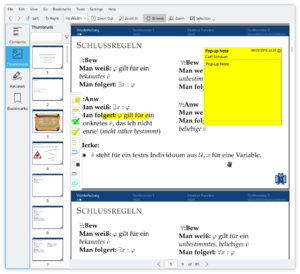Okular/de: Difference between revisions
(Created page with "== Was ist Okular? ==") |
(Updating to match new version of source page) |
||
| (27 intermediate revisions by 3 users not shown) | |||
| Line 2: | Line 2: | ||
== Was ist Okular? == | == Was ist Okular? == | ||
Okular is a universal document viewer developed by KDE. Okular works on multiple platforms, including but not limited to Linux, Windows, Mac OS X, *BSD, etc. | |||
Sie können die Entwicklung des Projekts auf der [http://okular.kde.org/ Homepage] verfolgen. | |||
== Hintergrund == | |||
Die Entwicklung begann als Teil von Google's Summer of Code Programm. Die Beschreibung des Projekts ist auf der [http://developer.kde.org/summerofcode/okular.html KDE Developer's Corner] verfügbar. | |||
'''Okular''' combines the excellent functionalities of [[Special:myLanguage/KPDF|KPDF]] with the versatility of supporting different kinds of documents, like PDF, Postscript, DjVu, CHM, and others. | |||
Die [http://okular.kde.org/formats.php Übersicht der unterstützten Formate] enthält eine Tabelle die im Detail die unterstützen Formate und deren Funktionen darstellt. | |||
[[Image:Okular-annotations.png|thumb|300px|center|Rezensionen in Okular; Rezensionen können innerhalb der PDF Datei mit abgespeichet werden.]] | |||
Neben der Unterstützung vieler Formate, bietet '''Okular''' Funktionen wie Text-Auswahl, Kommentierung, Extraktion von Dateien die in einem Dokument eingebettet sind und viele andere Überraschungen. Bildschirmfotos von '''Okular''' in Aktion können Sie [http://okular.kde.org/screenshots.php hier] sehen. | |||
[ | Sie können zu Entwicklern und anderen Anwendern im IRC sprechen, irc.freenode.org, Kanal [irc://irc.kde.org/#okular #okular]. | ||
Wenn Sie daran interessiert sind einen Beitrag zu '''Okular''' zu leisten, [http://okular.kde.org/contact.php kontaktieren Sie bitte das Team]. Programmierer, aber auch die, die nicht kodieren sind willkommen. | |||
== Tipps und Tricks == | |||
=== Rezension === | |||
Ein Doppelklick auf eines der '''Rezension'''s Werkzeuge (<keycap>F6</keycap>) erlaubt es ihnen mehrere Anmerkungen durchzuführen, ohne das Sie nach der ersten Benutzung das Werkzeug wieder aktivieren müssen. | |||
How to keep the annotations you made to the PDF file: | |||
By default, '''Okular''' saves annotations in the local data directory for each user. Since KDE 4.9, it's optionally possible to store them directly in a PDF file by choosing <menuchoice>File -> Save As...</menuchoice>, so they can be seen in other PDF viewers. | |||
Note that this feature requires Poppler 0.20 or newer for regular PDF documents. If the PDF document you are annotating is encrypted, this feature requires Poppler 0.22 or newer. | |||
[[Category:Grafik/de]] | |||
[[Category: | |||
Revision as of 06:20, 29 September 2018
Was ist Okular?
Okular is a universal document viewer developed by KDE. Okular works on multiple platforms, including but not limited to Linux, Windows, Mac OS X, *BSD, etc.
Sie können die Entwicklung des Projekts auf der Homepage verfolgen.
Hintergrund
Die Entwicklung begann als Teil von Google's Summer of Code Programm. Die Beschreibung des Projekts ist auf der KDE Developer's Corner verfügbar.
Okular combines the excellent functionalities of KPDF with the versatility of supporting different kinds of documents, like PDF, Postscript, DjVu, CHM, and others.
Die Übersicht der unterstützten Formate enthält eine Tabelle die im Detail die unterstützen Formate und deren Funktionen darstellt.

Neben der Unterstützung vieler Formate, bietet Okular Funktionen wie Text-Auswahl, Kommentierung, Extraktion von Dateien die in einem Dokument eingebettet sind und viele andere Überraschungen. Bildschirmfotos von Okular in Aktion können Sie hier sehen.
Sie können zu Entwicklern und anderen Anwendern im IRC sprechen, irc.freenode.org, Kanal #okular.
Wenn Sie daran interessiert sind einen Beitrag zu Okular zu leisten, kontaktieren Sie bitte das Team. Programmierer, aber auch die, die nicht kodieren sind willkommen.
Tipps und Tricks
Rezension
Ein Doppelklick auf eines der Rezensions Werkzeuge (F6) erlaubt es ihnen mehrere Anmerkungen durchzuführen, ohne das Sie nach der ersten Benutzung das Werkzeug wieder aktivieren müssen.
How to keep the annotations you made to the PDF file:
By default, Okular saves annotations in the local data directory for each user. Since KDE 4.9, it's optionally possible to store them directly in a PDF file by choosing , so they can be seen in other PDF viewers. Note that this feature requires Poppler 0.20 or newer for regular PDF documents. If the PDF document you are annotating is encrypted, this feature requires Poppler 0.22 or newer.
